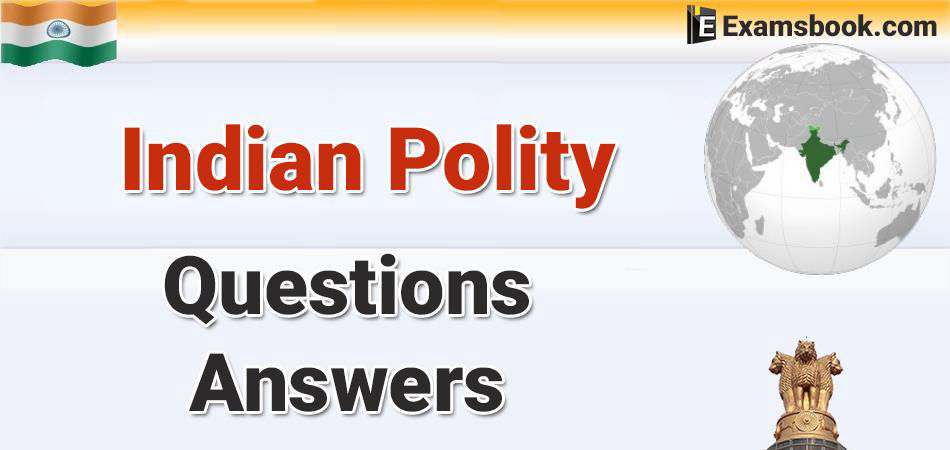Indian Polity Questions for Competitive Exam

The Act enabled the Governor General to associate representatives of the Indian People with the work of legislation by nominating them to his expanded council ?
(A) Government of India Act, 1858
(B) Government Act of India Act, 1861
(C) Government of India Act, 1892
(D) Government of India Act, 1915
Correct Answer : B
Explanation :
The Government of India Act, 1861 was an act of the Parliament of the United Kingdom which consolidated the earlier acts relating to British India into a single Act.
The Act was passed to consolidate the provisions of the preceding Government of India Acts ?
(A) Government of India Act, 1858
(B) Government of India Act, 1861
(C) Government of India Act, 1892
(D) Government of India Act, 1915
Correct Answer : D
Explanation :
An act of the Parliament of the United Kingdom consolidated prior Acts of Parliament concerning British India into a single act. It was passed in July 1915 and went into effect on 1 January 1916. An Act to consolidate enactments relating to the Government of India.
The parliamentary committee to review the report of the Comptroller and Auditor General of India is?
(A) Assessment Committee
(B) Public Accounts Committee
(C) Select Committee
(D) None of these
Correct Answer : B
Explanation :
The function of the Public Accounts Committee is to examine the annual audit reports of the Comptroller and Auditor General of India (CAG), which are laid before the Parliament by the President.
What permission does the “Vote on Account” give to the Union Government?
(A) Permission to take public debt
(B) Permission to take loan from RBI
(C) Permission to provide grants to the states
(D) Permission to withdraw money from the Consolidated Fund of India for a specified period
Correct Answer : D
Explanation :
A vote on account is the process by which an incumbent government obtains votes from Parliament to draw money from the Consolidated Fund of India to meet its expenses until the elections are done.
As per the Constitution, all the revenue received by the Union government and the loans raised by it is parked in the Consolidated Fund of India.
In the run-up to every general election, Parliament votes to sanction the withdrawal of money from this fund to meet regular government expenses such as payment of salaries and interest. Vote-on-account is a temporary measure, it does need the approval of Parliament and it is usually passed without much discussion.
It is usually valid for two months until the new government presents a full Budget. Ministries and departments can utilize the funds available for non-plan expenditure which includes payments of salary to government employees, loan interest payments, subsidies, and pension payments, based on the vote on account.
Under which of the following pardoning power of the President, the nature of punishment is mitigated?
(A) commutation
(B) avoidance
(C) postponement
(D) procrastination
Correct Answer : A
Explanation :
Article 72 of the Constitution empowers the President to grant pardons to persons who have been tried and convicted of any offense.
Before the independence of India, Dadra and Nagar Haveli were under the administrative control of?
(A) English
(B) French
(C) Portuguese
(D) Afgans
Correct Answer : C
Explanation :
Dadra and Nagar Haveli were small undefended Portuguese overseas territories, part of Portuguese India since 1779. The territories were enclaves, without any access to the sea, administered by the Portuguese Governor of the district of Damão.
Is it necessary to place the proclamation of National Emergency before the Parliament for its approval?
(A) within a month
(B) within six months
(C) within a year
(D) within two months
Correct Answer : A
Explanation :
A state of emergency refers to a period of governance that can be proclaimed by the President of India during certain situations. National Emergency can be declared on the basis of war, external aggression or armed rebellion. The constitution employs the expression 'proclamation of emergency' to denote an emergency of this type. A proclamation of emergency must be placed before the Parliament for its approval within one month. It must be approved by both the houses of parliament. Article 352 of the constitution deals with National Emergencies.
Consider the following statements A and B select the answer from the alternatives given below –
A – There are two or more levels of government
B – Each level has its own jurisdiction in matters of legislation, taxation and administration:
(A) A is true and B is false
(B) Both A and B are true
(C) Both A and B are false
(D) A is false and B is true
Correct Answer : B
Explanation :
Federalism is a system of government in which the power is divided between a central authority and various constituent units of the country. Usually, a federation has two levels of government. One is the government for the entire country which is usually responsible for a few subjects of common national interest.
Which one of the following is NOT an example of an exercise of Fundamental Rights?
(A) Workers from Bihar go to Punjab to work on the farms.
(B) Christian missionaries set up a chain of missionary schools.
(C) Men and Women government employees get the same salary and allowances.
(D) Paternal property is inherited by their children.
Correct Answer : D
Explanation :
Children inheriting their parent's property is not an exercise of a fundamental right.
Which candidate’s name has been nominated by the BJP-led NDA for the Presidential elections in 2022?
(A) Draupadi Murmu
(B) Yashwant Sinha
(C) Jagdeep Dhankar
(D) Margaret Alva
Correct Answer : A
Explanation :
The Bharatiya Janata Party-led National Democratic Alliance (NDA) on Tuesday announced former Jharkhand Governor Draupadi Murmu's name as Presidential candidate for the upcoming elections.



